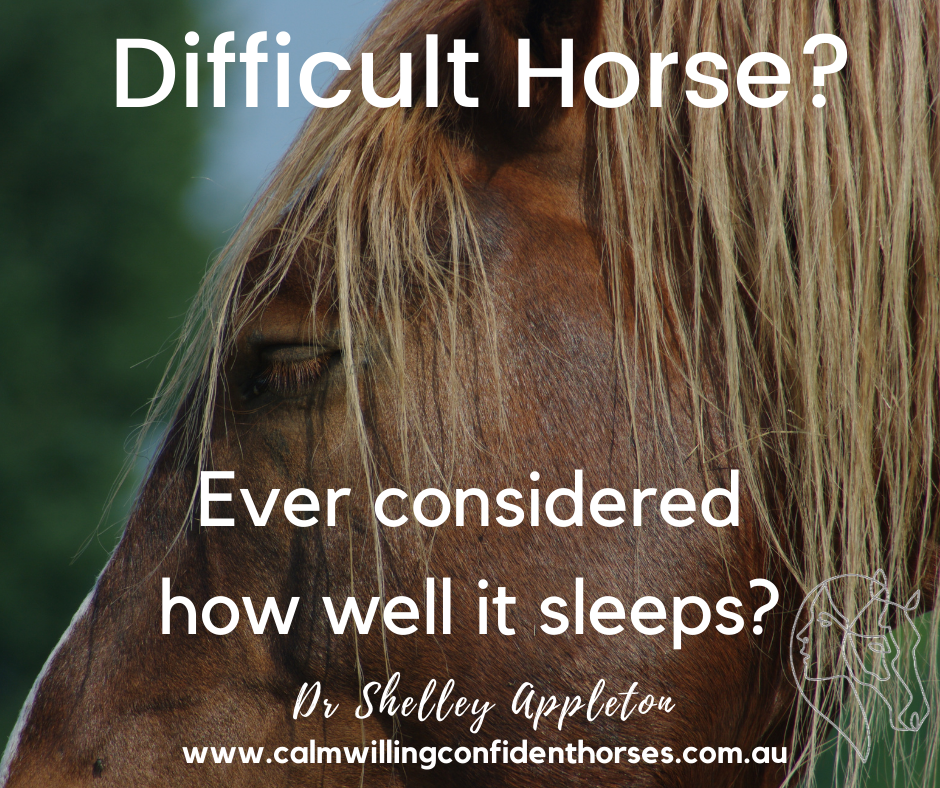Sleep deprivation in horses
Got a Difficult Horse? Ever Considered How Well Your Horse Sleeps?
One of my online coaching cases this week was a horse that whilst at rest would appear to be drifting to sleep and then falling over. He would then immediately scramble to his feet again. I have worked with several horses whose owners have witnessed similar behaviour.
First up, there are several reasons that can cause such symptoms. These include heart conditions (causing fainting), narcolepsy, neurological conditions, brain tumors, genetic conditions (e.g. Hyperkalenic Periodic Paralysis) and so on. Therefore, if you ever see your horse do this, please make sure you consult your vet.
Many people label this narcolepsy, but this is a rare neurological disorder and tends to happen more at times of stress or physical exertion. In the case I was reviewing, the horse most likely suffered a “sleep attack”, which is caused by sleep deprivation and tends to present when the horse is resting.
The horse has three phases of sleep. The first restful phase is known as “light sleep” and occurs when horses are relaxed. The second phase is known as slow-wave or deep- sleep and occurs when the horse transitions into a deeper level of relaxation. Both these phases of sleep can occur when the horse is standing. The final phase is called paradoxical or REM (rapid eye movement) sleep and can only occur when the horse is laying down as it requires complete muscle relaxation.
To maintain health, horses need 30-60 minutes of paradoxical sleep per day. If horses are unable to achieve this phase of sleep for 7-14 days, they can become sleep deprived.
Sleep deprivation is caused from the horse not feeling comfortable to lay down. This can be caused from physical pain or from emotional discomfort such as not feeling safe enough to lay down.
Physical pain can be due to things such as arthritis, gastric ulcers, internal adhesions, or even intestinal stones known as enteroliths that can form in horses due to diets high in magnesium etc. Therefore, causing the horse to experience pain when it lays down. Because of this the horse stops laying down. Another aspect of discomfort is having nowhere comfortable to lay down. Therefore, if you keep horses outside in a paddock and you never see them lay down, maybe consider putting a load of sand down and seeing if that changes their frequency of laying down!
The other main reason horses may feel uncomfortable to lay down is if they feel unsafe. This can be due to things such as living with another horse that either bosses them around or they feel inspired to boss around. New environments, for example if you have moved the horse to a new location can grossly unsettle a horse. This can cause stress, but it can also trigger things such as gastric ulcers which then cause pain and thereby causing a vicious cycle of emotional stress and pain which ultimately results in sleep deprivation. Changes in the environment that are distressing the horse. Separating a horse from another horse they have closely bonded with. Or, horses draw their emotional stability from other horses and therefore, experience chronic stress because they are constantly triggered by the movement or presence of other horses.
Sleep deprivation can have profound effects on horse behaviour and performance. They can struggle to learn, be overwhelmed easier, cope with way less, suffer anxiety and suffer injury from sleep attack falls.
Therefore, if you are having trouble with a horse, its anxiety or inconsistent performance, it is something to consider! Observe your horse in its paddock or if it is stabled, is there any evidence the horse is lying down? Have you seen your horse lay down or roll? A horse that does not roll, might be a horse that suffers discomfort from lying down!
If you do suspect your horse might be suffering from sleep deprivation, it is important to seek veterinary help and advice. If pain is found to be a possible cause, then pain management will be an important treatment for the sleep deprivation. If it becomes evident that the horse might not be lying down due to emotional reasons and feeling unsafe, steps will need to be taken to address this. It might be necessary to separate horses, change living arrangements, change diet, and even change environments. I have seen anxious horses transform in days after moving to a new home, changing paddock arrangements or go from being stabled to paddocked 24/7.
Therefore, if you ever find yourself frustrated by a horse that is inconsistent, difficult or struggles to learn and you have had the horse investigated for all different types of problems, but the horse health professionals keep drawing a blank or their suggestions have not helped – consider how well your horse is sleeping!
References – for more information on this topic check out the following articles:
